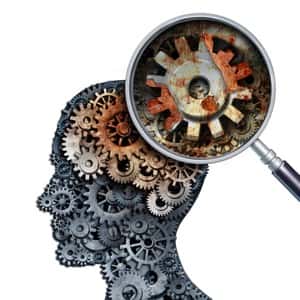
Will powerful proton pump inhibitors (PPIs) that are widely taken my millions of people every day affect the brain? Do such drugs pose a risk for dementia? This reader asks a disturbing question?
Q. I have been taking Protonix twice a day for almost 15 years. I am worried about the connection between PPIs like Protonix and dementia, but I don’t want to give up the drug. It has made such a difference in relieving my heartburn! If I start to notice memory problems, what should I do?
A. Pantoprazole (Protonix) like other proton pump inhibitors (PPIs) such as esomeprazole (Nexium), lansoprazole (Prevacid) and omeprazole (Prilosec) eases symptoms of heartburn by dramatically reducing acid production. When these drugs were first marketed they were perceived as very safe.
In recent years concerns have been raised about long-term use and side effects. Reports have suggested such drugs may lead to nutrient deficiencies (vitamin B12, calcium, iron, magnesium), osteoporosis and fractures, infections (C. diff and pneumonia), kidney disease and heart attacks. More recently PPIs have been associated with an increased risk of dementia (JAMA Neurology, April, 2016):
“The avoidance of PPI medication may prevent the development of dementia. This finding is supported by recent pharmacoepidemiological analyses on primary data and is in line with mouse models in which the use of PPIs increased the levels of β-amyloid in the brains of mice. Randomized, prospective clinical trials are needed to examine this connection in more detail.”
Gastroenterologists Respond:
Not surprisingly, there has been a lot of push back from the gastroenterology community when it comes to reports of PPI side effects. Gastroenterologists love these drugs and have prescribed huge quantities over the last few decades.
We have heard a classic argument: People taking proton pump inhibitors are older and sicker than other patients. A drug company sales representative once told us that an antihistamine that was linked to sudden death from irregular heart rhythms couldn’t be causing serious trouble. She insisted that the patients who died were older and sicker and “would have died anyway.” We weren’t buying that argument decades ago and we are having a hard time swallowing it today as a deflection of PPI-associated complications.
Another argument is that the studies linking PPIs to dementia are based on “observational studies.” In other words, they are unreliable because they are not randomized controlled trials where one group gets the PPI and another group gets placebo. An overview in the journal Current Opinion in Gastroenterology (Nov. 2016) has offered the following points:
- Side effects from PPIs are uncommon events.
- Epidemiological studies like the one in JAMA Neurology “should be taken with a grain of salt as these studies, by design, cannot demonstrate cause and effect and are limited by the inability to control for bias and confounding variables.”
- The authors point out that the drugs are in the bloodstream for a relatively short period of time and therefore could not cause heart attacks, dementia or kidney damage.
- And finally, they imply that medical journals that report adverse PPI reactions based on epidemiological data do great harm because the media report the results of such studies causing more harm than good.
We will not take time to refute these points. Here are conclusions from a few journals over the last year or so:
The Dutch journal, Nederlands Tijdschrift Voor Geneeskunde, 2016, published this article: “Proton Pump Inhibitors: Not As Safe As They Seem.”
“It is important to prescribe a PPI only when there is a good indication for use. Patients with chronic PPI use should be checked periodically to see whether there is still an indication. If any of the listed side effects [gastroenteritis, respiratory tract infections, hypomagnesaemia, renal function disorders, vitamin B12 and iron deficiency, dementia, osteoporosis and fractures] should occur, it is advisable to consider PPI as a possible cause.”
The journal Annals of Translational Medicine (June, 2016) concluded:
“Our study demonstrated an increased risk of dementia among PPIs users. Whether this association is causal requires further investigations.”
In the Expert Review of Clinical Pharmacology (July, 2013) an article titled “Perils and Pitfalls of Long-term Effects of Proton Pump Inhibitors” summarized these findings:
“This review summarizes the literature regarding long-term adverse effects of proton pump inhibitors (PPIs)…The risk of pneumonia was increased 27-39% in short-term use of PPIs in three meta-analyses. C. difficile infections were also associated with the use of PPIs (odds ratio: 2.15). This effect appears to be dose related. The US FDA has recently issued a warning regarding fractures and the impaired magnesium absorption associated with the use of PPI. Thrombocytopenia, iron deficiency, vitamin B12 deficiency, rhabdomyolysis and acute interstitial nephritis have also been reported with the use of PPIs. There is mounting evidence that PPIs are associated with serious adverse effects. Practitioners should be vigilant and counsel patients accordingly.”
What Should Patients Do?
Here is our answer to the person who asked the question at the top of the page:
Never stop a PPI suddenly as that could trigger unbearable heartburn that can last for weeks. Monitor your cognitive function regularly. Ask your doctor to refer you to a neurologist for a baseline examination.
We are sending you our Guide to Digestive Disorders with information on other strategies to ease symptoms of heartburn. Anyone who would like a copy, please send $3 in check or money order with a long (no. 10) stamped (68 cents), self-addressed envelope: Graedons’ People’s Pharmacy, No. G-3, P. O. Box 52027, Durham, NC 27717-2027. It can also be downloaded for $2 from the website: www.peoplespharmacy.com.
You may find that drugs histamin-2 antagonists like famotidine (Pepcid) or ranitidine (Zantac) will soothe your symptoms without some of the complications of PPIs. Ask your doctor whether such drugs would be a reasonable option. Home remedies such as ginger, mustard, chewing gum or even baking soda may also help. More details are in the guide.

